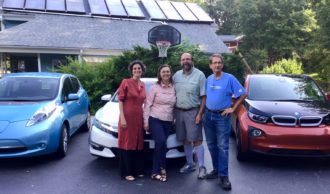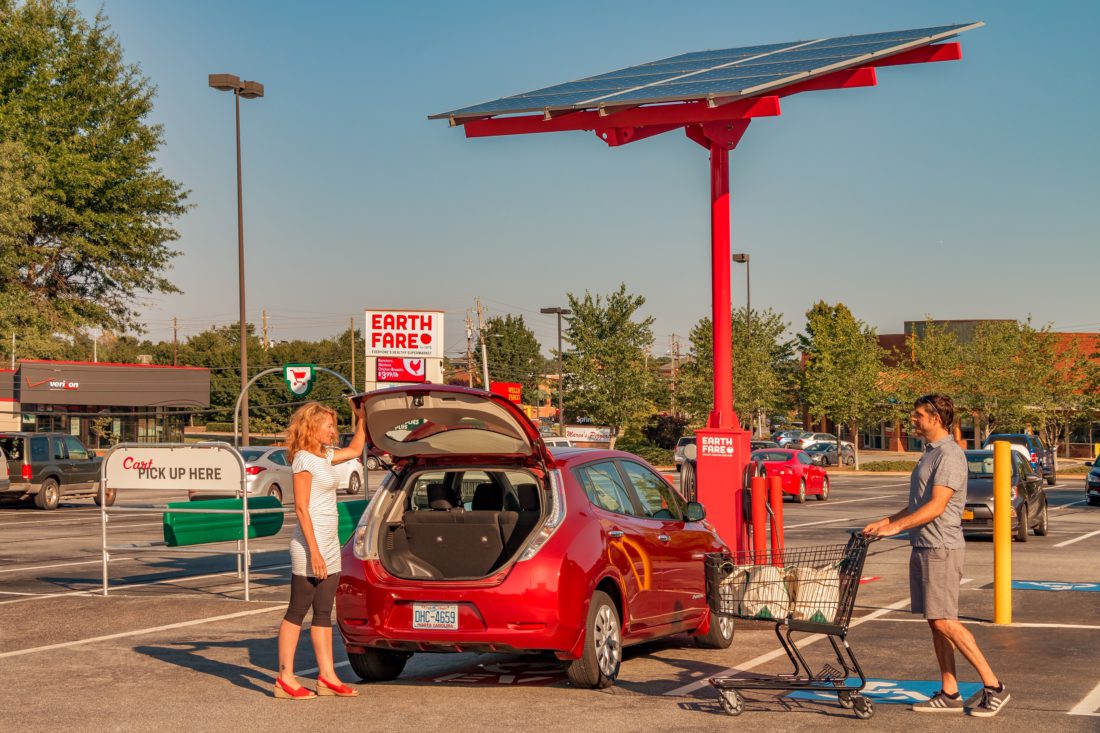Owning and driving an electric car may soon get a lot easier for residents of Western North Carolina. Although nearly 100 public charging stations are currently installed within 15 kilometers (9 miles) of Asheville, according to ChargeHub — a sixth of the approximately 600 charging stations installed across the state — many more are on the way. Governments, businesses and private individuals are all accelerating their efforts to electrify the way WNC gets around.
The region’s push for electric vehicle infrastructure comes as part of a statewide effort initiated by Gov. Roy Cooper. In his Executive Order 80, which lays out North Carolina’s commitment to address climate change and transition to a clean energy economy, the governor calls for at least 80,000 zero-emission vehicles to be registered in the state by 2025. Roughly 4,500 all-electric vehicles had been registered in North Carolina through 2017, the most recent year for which U.S. Department of Energy data is available.
More EVs on the road means more charging stations will be needed to meet the growing demand for power. Companies such as Asheville-based Brightfield Transportation Solutions, as well as private citizens, are stepping up to meet the challenge. And Duke Energy, the state’s regulated public utility, recently proposed the N.C. Electric Transportation Pilot — the Southeast’s largest utility EV initiative yet.
“Executive Order 80 is the kind of policy that will help drive the market in North Carolina,” says Brightfield owner Stan Cross. “And Duke Energy’s ET Pilot will help bring the resources forward to deploy charging infrastructure to support EV drivers and bus fleets. Both are really important in growing the local EV market. We need to recognize that the market is still very young, and when you’re trying to make such a monumental change, utility investment and state policy are critical.”
Demand spike
According to InsideEVs.com, nearly 149,000 fully electric vehicles have been sold or leased in the U.S. since January — a considerable increase over the same period for 2018, when customers purchased about 124,000 battery-driven cars. To meet this influx of EVs, Duke Energy spokesperson Randy Wheeless says his company is preparing for major action.
“The EV movement is changing rapidly,” Wheeless says, “and Duke Energy is taking big steps with their $76 million ET Pilot initiative. This program will spur EV adoption across the state, provide incentives to customers and lead to a statewide network of fast-charging stations to meet growing demand.”
Pending regulatory approval, the pilot program would start this year and run for three years to research vehicle loads and accelerate the adoption of electric transportation technologies. In addition to installing and operating over 800 public charging stations across North Carolina, including around 200 in the western part of the state, Duke plans to offer $1,000 rebates for customers to install their own charging infrastructure and support the purchase of up to 85 electric school buses.
Wheeless estimates that 95% of comments submitted to the N.C. Utilities Commission about Duke’s ET Pilot support the program, with backers including the Asheville-based Blue Horizons Project, Sierra Club and Southern Environmental Law Center. He says Duke disagrees with negative comments made by the commission’s public staff and several renewables industry trade groups.
“The naysayers argue that there’s no benefit to North Carolina investing in EV charging stations,” Wheeless says. “North Carolina Sustainable Energy Association claims that Duke’s pilot program would entirely flood the market with public Level II [higher-power] plugs, leaving no room for further market participation. Really? Should ‘flooding the market’ really be a concern?”
Jordan Jones, the NCSEA’s engagement and equity specialist, says her organization supports parts of the Duke pilot but worries about its approach to charging stations. “Too much uncertainty in Duke’s analysis and current market understanding left us concerned that Duke will have too much market control over EV infrastructure and deployment, which could be bad for ratepayers and EV drivers,” she says.
Leading the charge
Cross isn’t waiting for Duke’s program to start driving electric infrastructure. His company installed its first three chargers in Asheville in 2012 and has since placed 81 stations throughout WNC, with locations including the South Asheville Earth Fare grocery, UNC Asheville and Hot Springs Resort and Spa. Six of those are Brightfield Solar Canopy systems that integrate the generation, storage and delivery of solar fuel to EVs.
“Although we represent a fraction of all EV activity,” Cross explains, “our focus is to leapfrog fossil fuel and get cars driving on sun power. We’re working on installing charging stations along with solar systems in order to offset the electricity that chargers put out with clean, renewable solar fuel.”

The residents of Westwood Cohousing are also making a move into EVs. The community of 24 households in West Asheville has installed charging stations for its electric car owners, with the first outlet arriving in 2017 at the suggestion of incoming community member Pana Columbus.
“After purchasing my Nissan Leaf in April 2017,” says Columbus, “I saw an opening at Westwood Cohousing and jumped on it, being that I wanted to live in an intentional community. However, the only way I could live at Westwood was if I could plug in my Leaf.”
Columbus voiced her request, and Daniel Sandoval, a member of Westwood since 2015 and the community’s utilities superintendent, went about moving a 120-volt plug from inside a member’s fenced backyard to the outside, giving Columbus access to the outlet in the community’s parking lot. That simple change, he said, encouraged him to shift his own transportation.
“Pana Columbus is a true trailblazer,” says Sandoval. “I wouldn’t have been as quick to buy my hybrid electric car if Pana hadn’t paved the way.”
The community now boasts three electric cars, and anticipating further demand, Duke Energy installed a dedicated meter last month with six 120-volt outlets, as well as one Level II charger. As a next step, Westwood is considering a proposal by Weaverville-based Sundance Energy Systems to install photovoltaic solar panels so the cars can run on pure sunshine, which community members hope will entice more residents to make the switch.
Current and resistance
Dave Erb, a retired UNCA professor, has been in the automotive engineering business since 1981 and currently owns both a Tesla Model 3 and Chevy Spark. As a member of several EV organizations, including the Electric Auto Association and Blue Ridge EV Club, he’s seen the industry go through its share of ups and downs. Now, he says, “electrification is ready for prime time today” in the vehicle market.
“I feel that there are enough electric cars on the road to prove there’s a real interest in EVs,” Erb says. “The downside is the huge amount of misinformation floating around.
“Naysayers will circulate studies about electric vehicles being worse for the environment than gas-fueled ones, and this kind of misinformation is coming not just from Fox News, but from The New York Times and NPR,” Erb continues. “Trillions of dollars’ worth of business is going to be disrupted by EV technology. They’re trying to delay the inevitable by spreading fear, uncertainty and doubt.”
However, Erb says that the increasing adoption of EVs has given those interested in switching from gas-powered transportation more avenues to learn for themselves. He points to the local community of EV owners, the Blue Ridge EV Club website and the electric car show coming to the Asheville Outlets on Saturday, Sept. 14, as ways for prospective buyers to get accurate info.
When it comes to the efforts of major players such as Duke and state government, Erb is cautiously optimistic. “While I certainly support the EV goals of Executive Order 80, I’m not so sure about Duke’s pilot project,” he comments. “Allowing Duke to enter this arena, which can be served by competitive businesses, will require us to be extra vigilant.”




Many of the elements on that ChargeHub link appear to be dead. I am seeing 177 Public EV Charging Stations in Asheville according to PlugShare – https://www.plugshare.com/directory/us/north-carolina/asheville